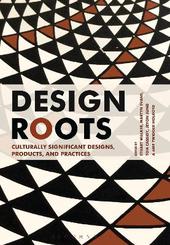
|
Design Roots: Culturally Significant Designs, Products and Practices
Hardback
Main Details
| Title |
Design Roots: Culturally Significant Designs, Products and Practices
|
| Authors and Contributors |
Edited by Stuart Walker
|
|
Edited by Dr Martyn Evans
|
|
Edited by Tom Cassidy
|
|
Edited by Dr Amy Twigger Holroyd
|
|
Edited by Jeyon Jung
|
| Physical Properties |
| Format:Hardback | | Pages:400 | | Dimensions(mm): Height 244,Width 169 |
|
| Category/Genre | Product design |
|---|
| ISBN/Barcode |
9781474241793
|
| Classifications | Dewey:745.2 |
|---|
| Audience | | Professional & Vocational | | Tertiary Education (US: College) | |
|---|
| Illustrations |
40 bw illus
|
|
Publishing Details |
| Publisher |
Bloomsbury Publishing PLC
|
| Imprint |
Bloomsbury Academic
|
| Publication Date |
8 February 2018 |
| Publication Country |
United Kingdom
|
Description
Design Roots provides a comprehensive review of culturally significant designs, products and practices which are rooted to particular communities through making tradition and a sense of place. Many rich traditional practices associated with community, tacit knowledge and culture are being rapidly lost due to globalisation and urbanisation. Yet they have much to offer for the future in terms of sustainability, identity, wellbeing and new opportunities in design. This book considers the creative roots, the place-based ecologies, and deep understandings of cultural significance, not only in terms of history and tradition but also in terms of locale, social interactions, innovation, and change for the sustainment of culturally significant material productions. Importantly, these are not locked in time by sentimentality and nostalgia but are evolving, innovative, and adaptive to new technologies and changing circumstances. Contributing authors explore the historical roots of culturally significant designs, products and practices, emerging directions, amateur endeavours, enterprise models, business opportunities and the changing role and contribution of design in the creation of material cultures of significance, meaning and value. An international perspective is provided through case studies and research from North and South America, Africa, Europe, Asia and Australasia, with examples including Aran jumper production in Northern Ireland, weaving in Thailand, Iranian housing design, Brazilian street design and digital crafting in the United Kingdom.
Author Biography
Stuart Walker is Professor of Design for Sustainability at Lancaster University, UK. Martyn Evans is Professor of Design at Manchester Metropolitan University, UK. Tom Cassidy is Chair of Design at the University of Leeds, UK. Jeyon Jung is Research Associate at Lancaster University, UK. Amy Twigger Holroyd is Senior Lecturer at Nottingham Trent University, UK.
ReviewsI savoured each bite-size essay and its ideas until the elephant was consumed. I then sat back and enjoyed the satisfaction of an admirable accomplishment. I would recommend this edited volume to thinking practitioners and researchers looking for inspiration - it is full of ideas worth pursuing. It takes head on a large challenge and offers illumination along a path forward. * Design Journal * Craft has deep roots and heritage but these material skills and ways of working are just as relevant today as they were centuries ago. Critical writing on craft, such as Design Roots, is crucial to ensure it continues to evolve and thrive. * Rosy Greenlees OBE, Executive Director of the Crafts Council, UK * 5 / 5 stars Engaging, insightful read for anyone with an interest in traditional craft or sustainable design. This book offers broad appeal to creatives and academics alike, focusing on the cultural significance of traditional craft and the potential for sustainability in a globalising world. Preliminary chapters introduce the key concepts and theoretical foundations of the book in a highly readable style. The cultural significance of designs, products and practices is deconstructed and situated within the context of a globalising world. Despite the apparent homogenisation of culture resulting from economic drivers such as trade, technology and urbanisation, the book charts a resurgence of the traditional, the situated, the local. Crucially, tradition is recognised as perpetually transforming and further, as potentially transformative, offering implications for sustainability in the recreation of a meaningful material culture. Drawing on research from across the world, a series of engaging case studies provide context to the discussion presented in the opening chapters. For example, the revelation of surprising myths surrounding the culturally significant |Aran jumper provide useful insight into the construction of authenticity and tradition and the study of Oltu-stone prayer bead production not only examines reasons for the loss of traditional handicrafts but also the potential for sustainability. Further case studies focus on examples of the revitalisation of culturally significant designs, products and practices. The potential of culture as a resource and design as a tool for sustainable development is examined. Importantly, the role and responsibility of the designer in transforming tradition is deliberated. The following series of case studies included in the book consider the broader context, examining structural factors that support revitalisation through design, detailing contemporary approaches to development. The final section is dedicated to the future, with emphasis on the role of design and the use of contemporary strategies, in the successful revitalisation of culturally significant designs, products and practices. Overall, this book roots well-considered theory in a wealth of relevant, contextual research, offering an engaging, insightful read to anyone with an interest in traditional craft or sustainable design. * Florence J. Logan, www.amazon.co.uk *
|